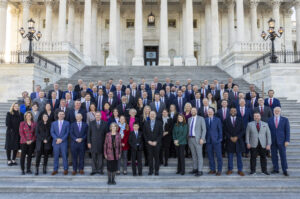IBAT joined the Independent Community Bankers of America, Texas Bankers Association, U.S. Chamber of Commerce and others in filing a lawsuit in the Northern District of Texas against the Federal Reserve, FDIC and OCC for exceeding their statutory authority and acting arbitrarily and capriciously with their recent amendments to the Community Reinvestment Act rules. The lawsuit asks the court to vacate the Final Rules, and the groups will also seek a preliminary injunction pausing the new rules while the court decides the merits of the case.
“Texas is a growing state, with new centers of population growth that are unserved by any financial institution,” said Christopher L. Williston, VI, president and CEO of the Independent Bankers Association of Texas. “As Texas community banks seek to serve new and diverse communities, they should be able to do so without unreasonable new standards that are impossible to satisfy. The new CRA rules are an overreach that disincentivizes growth and undermines community banks’ ability to meet the needs of the communities they serve.”
The complaint explains how the new rules will limit future bank lending, and identifies how the regulatory agencies exceeded their statutory authority in violation of the Administrative Procedure Act by:
- Evaluating bank lending well beyond banks’ deposit-taking footprint, as required by CRA. The Final Rules will evaluate bank lending across the entire country, eliminating the statutory focus on a bank’s lending in its “local community.”
- Evaluating some institutions’ records of providing deposit products and services to low- and -moderate-income consumers even though the CRA only authorizes regulators to assess a bank’s record of meeting the credit needs of its local communities.
The complaint highlights how the 1977 law explicitly limited regulators’ statutory authority:
“The Agencies rely heavily on the authority delegated to them ‘to carry out the purposes’ of the CRA, but that authority does not give the Agencies authority to ignore the plain text of the CRA. And even Congress’s statement of purpose focused on ‘local communities,’ a phrase that cannot be understood as capaciously as the Agencies would need it to be read to ignore the geographic limitations of deposit-taking branches.”
It also describes how the agencies engaged in unreasoned and unreasonable decision-making, or acted “arbitrarily and capriciously,” in violation of the Administrative Procedure Act:
“The CRA requires periodic evaluation of a bank’s CRA performance, but the Final Rules leave banks guessing about what areas will be assessed, which products will qualify for CRA evaluation, and what market benchmarks they must meet in order to earn a Satisfactory, much less an Outstanding, rating. Further, the costs of the Final Rules are enormous, both at the implementation stage and on an annual basis going forward. Yet the Agencies offer no predictions, let alone evidence, that the Final Rules will lead to more lending of the sort that the CRA was designed to encourage. To the contrary, the Agencies turn a blind eye to the substantial likelihood that these Final Rules will actually reduce lending to low- and moderate-income borrowers. Such decision-making violates the APA.”
The complaint cites industry analysis showing the cost for banks to comply with the Final Rules in the first 12 months could exceed $600 million.
The complaint further asserts:
“While the Agencies may indeed have introduced through the Final Rules ‘more rigor and stricter standards,’ what they have failed to do is produce any meaningful evidence that the new burdensome tests will increase lending in low- or moderate-income communities—the very purpose of the CRA. Indeed, these rules may have just the opposite effect. Some banks may elect not to lend, or to scale back lending, in areas outside their geographic deposit-taking footprint to avoid triggering assessment areas outside their local community.”
IBAT and our co-plaintiffs will call on the court to immediately intervene and issue a preliminary injunction that will prevent the new rules from taking effect. In addition, the plaintiffs ask the court to issue an order and judgment setting aside the CRA rules as illegal or impermissible.
Read the full complaint here.
Read the full press release here.




